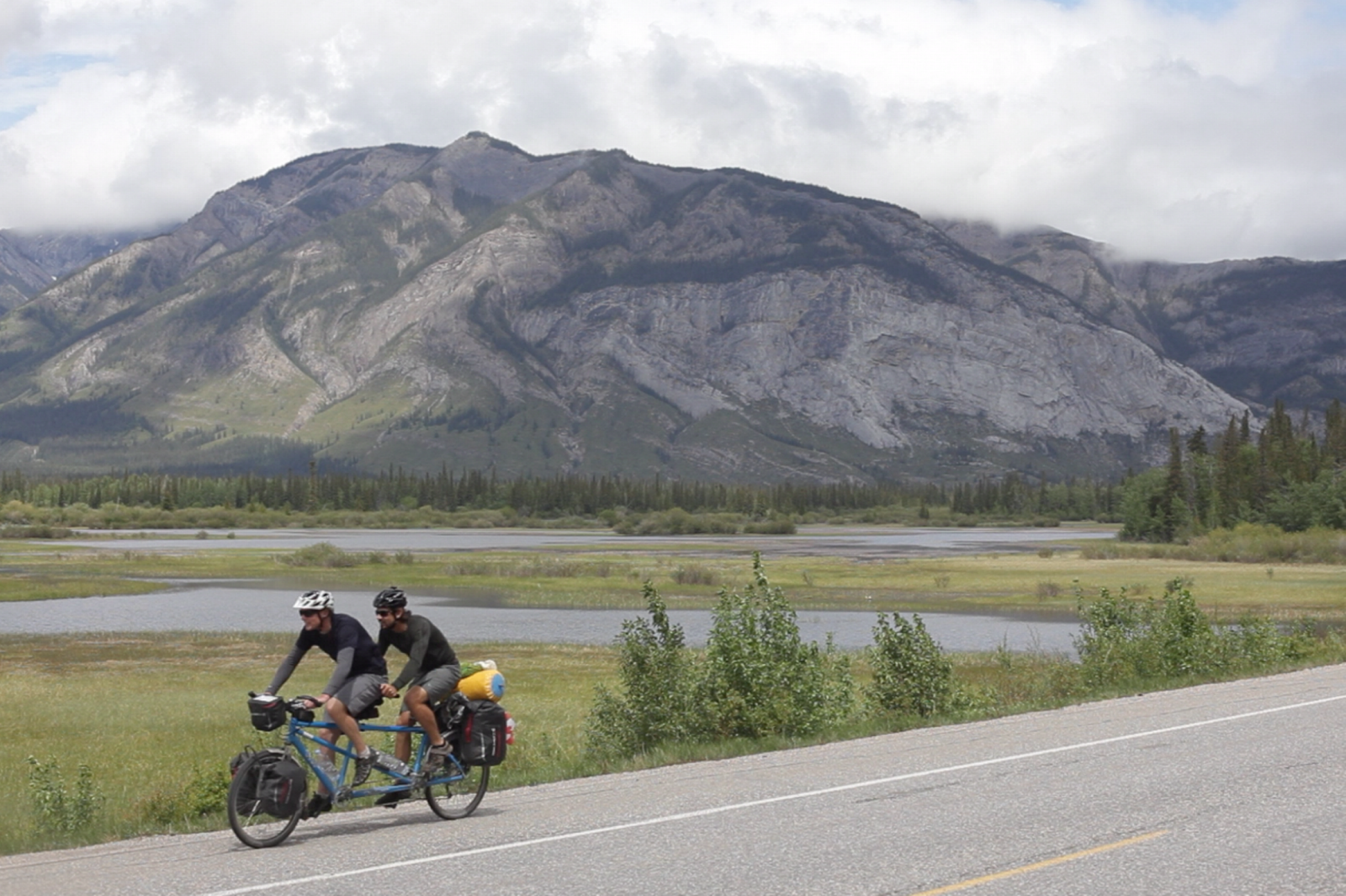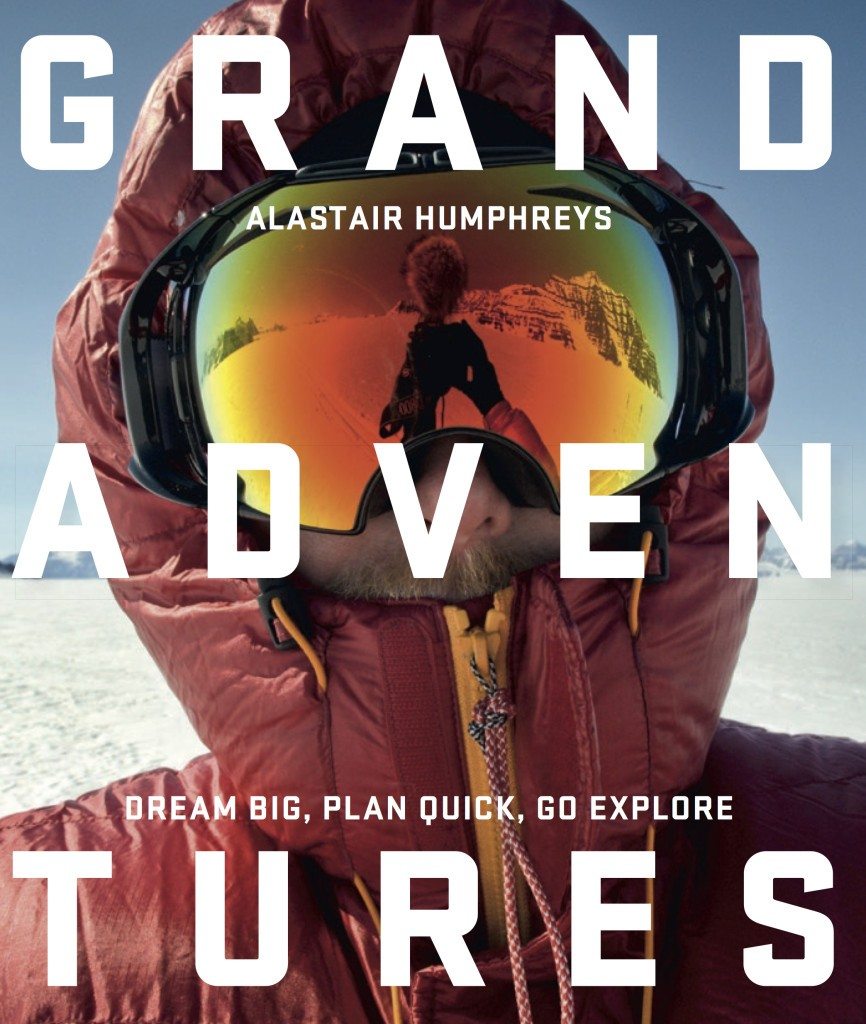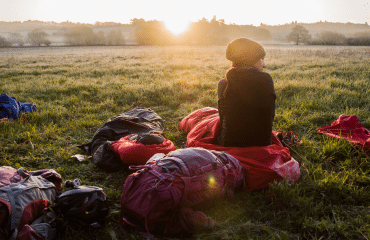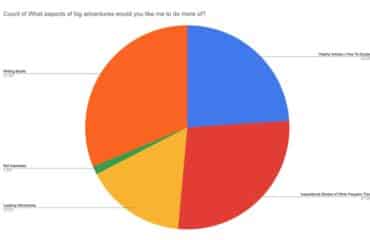Dom Gill is an award winning film-maker. His first big journey was a wonderful trip called ‘Take A Seat’ which entailed him cycling from Alaska to Patagonia on a tandem, picking up random passengers along the way…
Alastair: Can you give me your “elevator pitch” of what Take a Seat was originally about?
Dom: It was the idea of inclusive adventure. Using a tandem bicycle not only to have an adventure myself and explore new places amongst a whole new set of people, but also to invite people to join me on that adventure and perhaps push their own boundaries of what they can experience in life.
Alastair: And so you set out to cycle from Alaska down to Patagonia. I interviewed a family earlier for this year, they did that exact same route. A mum, a dad and an eight-year-old daughter. So I’mm interested to compare and contrast your two experiences.
Dom: I started as many red-blooded adventurers do, thinking I wanted to prove to the world how tough I am and how I can get from A to B without the help of anybody. But I was also very interested in making this first journey a springboard into the world of documentary filmmaking. So I wanted to film it. I had very little experience, but I bought a camera and pitched the idea of traveling on a single bike from Alaska to Argentina and with a number of sort of observational projects along the way. And I pitched it to a TV company. And one TV Company took interest and said this is an interesting idea, but it’s not quite interesting or crazy or stupid enough to garner the attention of the television-watching world.
I was slightly offended by this. I figured 20,000 miles on any kind of bicycle was interesting enough. But off the top of his head this TV exec said, “Well why don’t you go on a tandem and pick up strangers.” For two weeks I thought, “this a ridiculous idea”, and there was absolutely no way I was going to do it.
I slowly began to realise that it was an incredible idea if it could be pulled off. And very quickly along the way, I was grateful for that backseat, that empty back seat, because it really encouraged me not only to ask for help, but to learn from the people around me in a way that I think a lot of people aren’t very good at unless they’re forced to do so. They check off the miles, they keep their head down, they camp out of sight. Whereas this tandem forced me to, if you like, ask for help, I suppose, in the simplest terms.
Alastair: Did that human side of the journey start to become more interesting to you than trying to physically go 20,000 miles under your own power?
Dom: Yeah, very quickly, within two or three weeks. I realised that the physical aspect of the journey, while it appealed to me, was massively secondary to seeing what I could learn from the people around me and seeing what they had to teach me.
Alastair: On my own bike trip I wanted to do it for the exact same macho reasons, but I realised quite soon that I was very fit and therefore I could cycle a very long way. That wasn’t actually that interesting anymore.
Dom: Yeah.
Alastair: Originally you were a climber. That was your passion. So why didn’t you go and do a climbing adventure?
Dom: I would say climbing is still my passion, but I begrudgingly realised when I thought about making a documentary that if I was into storytelling, I had to mix with other people of some kind. In order to make an engaging story, generally speaking, you have to mingle with communities. And what climbing does by and large is take you away from communities into isolation and into your own head, into your own struggles. And cycling, because of the nature of it taking you along relatively major thoroughfares does the exact opposite and you stand a very good chance of meeting some interesting characters. So that was really the reason. If I could have found a way of doing a climbing trip that was community based, I might have done that. But it also doesn’t allow you to travel over great swathes of land.
Alastair: Yeah. Have you seen that The Road to Karakol by Kyle Dempster?
Dom: I’mve heard a lot about it. Funnily enough, I still haven’t seen it. But apparently, it’s great.
Alastair: Yeah, that is a very cool example of a climbing and also cycling film that doesn’t involve anyone else at all.
Did the actual process of filming your trip add to the experience or was it a pain in the arse?
Dom: It was definitely both. I can’t really imagine doing any kind of expedition or journey or adventure that I really care about without filming it these days. It’s like an extension of my right arm I suppose. And the reason is because I love the art of filmmaking, but it’s also because it makes me open my eyes a little wider. And while I’mm sitting at that junction in what may appear to be a shitty city, hungry, don’t particularly want to interact, I realise that in order to make a film I need to either interact or I need to look for a second layer of interest in that place. And the camera helps force me not to be psychologically lazy when I’mm exploring.
Alastair: That is a good way of looking at it. Moving on from that then in terms of the laziness of journeys, whilst going on a trip by yourself can be hard because there’s no one to cheer you up, it can also be quite psychologically easy because it’s just you on your own. You can what you want to do. Similarly, if you go with a very good friend that’s relatively simple, although you may fall out. But how is it travelling with strangers? Bike trips are hard, tiring, stressful, frightening. How did you find the experience of constantly having new strangers to travel with?
Dom: You end up having an accelerated trajectory of trust building over a period of time. Not only because I’mm piloting a tandem, but because you’re both going through territory that you’re not that familiar with. So you have nothing but each other to rely upon. Plus, as you know, sleeping within six or ten inches of each other every night has a way of breaking down barriers.
Alastair: Were there ever people who joined you who you ended up hating? And if so, how did you deal with that?
Dom: There were definitely a small handful of companions that I don’t think we saw eye to eye. The tandem, though, was an amazing filter mechanism. Generally, people didn’t get on the tandem if they didn’t at least see something in common with me. It automatically picked people that see some kind of benefit to the adventure ahead of them. So that was good.
Alastair: I think you’re in a good position to compare and contrast doing a long journey solo versus going with other people…
Dom: I still love the idea of doing solo journeys. There is something very viscerally primeval about it. I like the introspection. And actually, I become a little addicted to the sort of low-level depression that I experience on those trips. You get very lonely. And when you’re lonely, you think very profoundly about all sorts of aspects of life. It may be depressing, but I’mm able to think creatively and write and expand upon ideas. I love that aspect of solo travel. And there’s always the bravado aspect of getting through it and getting through to the other side and talking about the fact that you did it on your own. Especially as a male, I think that’s a little attractive.
Doing stuff with companions I think is more conducive to learning life lessons. Having to mix with all these new people who moments ago were strangers gives me a very refreshing understanding of people. And I like to think that increases my ability to communicate with the world around me.
Alastair: It would be a very different experience traveling the way you did [picking up random strangers and carrying them down the road] on a tandem versus on two bicycles. Two bicycles you have more freedom but also the huge stress of people going at different speeds.
Dom: Absolutely. Doing bike tours on separate bikes, to a certain extent, is the best of both worlds. They can cycle a mile apart for days at a stretch and just meet up for dinnertime or whatever. And that allows that space and introspection. But they also have the companionship when they want it. I think that’s a lovely way to go about it. The downside as far as I’mm concerned, is if I’md had the opportunity to travel with a relative friend for a long period of time on two separate bikes, is if you don’t want to get to know the world around you, you can bunch together and create a fairly insulated environment in which to travel. I’mm quite lazy like that.
Alastair: Yeah. That’s all very true. Can you compare and contrast the experience of your bicycle journey in North America versus the one in Egypt?
Dom: From a physical perspective, they were very different journeys. In Egypt there was a support vehicle [to help with the film we were making]. We didn’t rely on the support vehicle for water or for food or equipment. We carried all that on the bike. However, having a support vehicle makes a huge psychological difference just generally. And to a certain extent, however hard you try and insulate yourself from it, it is a safety net and it is an insulating property that you have from the world around you. Especially when you’re asking strangers for help. Because like it or not, somewhere in the background is a Toyota Land Cruiser. And that has everything that would negate any reason that you would need to ask for help. So it made it made it much harder to interact with people in Egypt.
Alastair: Tell me then about the difference, or perceived difference, in terms of safety.
Dom: The perceived difference is marked. In North America people don’t tend to worry too much despite the higher gun ownership and violent crime statistics than most other places in the world! I certainly had no issues in North America, however. I would love to know if I would have had issues if my skin colour was different. I suspect it might have been a very different story.
In Egypt, the perceived danger was huge around the time of the revolution. We arrived there just after Hosni Mubarak had been ousted. Almost all foreign press were warning against going. However, again as you well know, often that’s only half the story. We arrived in Egypt and found more than safety, we found an incredible and overwhelming sense of euphoria that for the first time people power had won over. And that made people incredibly friendly and trusting, I suppose.
The danger element was really nowhere to be seen.
Alastair: For someone who’s dreaming of going off on a big adventure, what would be your advice for how you actually make that happen? To go from someone who might be reading this blog to someone who is actually on their bike pedalling down the road? Did you find it difficult to make that step rather than say going to get a proper job?
Dom: Funnily enough, I didn’t. I’mm very much a person who only talks about a project if there’s a 95% chance that I’mm going to follow through with it. Because one thing I hate doing is sounding like a prick. I like the world to believe me when I say something, I suppose. And there are a lot of people out there that I know that aim for the stars in rhetoric and that’s about it. So the commitment issue was not difficult.
That would be completely different for someone coming from a well-paid job, and ejecting themselves out of that. I had the good fortune of deciding to do this journey before my salary was anything close to what I could earn at McDonald’s. So it was like I had nothing to lose. That makes everything a lot easier. The biggest advice I would give to people, and I don’t know how much you would agree with this or not, is make a real effort not to plan too much.
Alastair: Yes. I think that’s fair.
Dom: I just found a lot of people ask me what equipment they’ll need or what route they should best take and it was more meaningful on mine because obviously I was relying on locals to guide me where they wanted really. But I would say leave time in your itinerary and your adventure, whatever it may be, for that chance meeting of an old lady who makes honey and wants to teach you how. Or whatever it may be.
Alastair: But then how about the process of committing to it?
Dom: Well, it’s kind of easy when it’s something that most of the world would give their right arm to do.
Alastair: That’s an important thing to remember, isn’t it? That although it can feel quite difficult and anguished and whatever to go do an adventure, it’s a ludicrously privileged thing to be able to do.
Dom: Absolutely. I’mm very tired of seeing the slightly naïve, “I’mm a white boy preaching about climate change by riding my motorbike from here to Senegal, sponsor me on my webpage” thing. Back in the old days people didn’t need a reason to get out on adventure. They did it because they were curious. And now people feel like, “I want to go out and have a really cool adventure. But I need it to sound like it’s worthwhile. So I’mm going to latch on to the idea that I need to be sponsored or I need to sponsor someone.” Certainly raising money for people is fantastic, but only if you believe in it. Otherwise just go and have an adventure.
Alastair: Definitely.
Dom: Rant over!
Alastair: Ha! What would you be your advice to someone who wants to head off on their first grand adventure and would like to film it? I’mm not talking practical advice like tripods. I’mm talking advice about whether you should bother doing it in the first place and whether to bother trying to pitch to TV companies.
Dom: It’s a very good question because filming takes a lot out of you. It’s a big proportion of your journey in the end if done right. So I think you do have to have a very long question and answer session with yourself and ask yourself why you are even thinking about taking a camera. If it is, as it is for a lot of people, an ego thing, you want to record yourself travelling through a landscape then I would ask a secondary set of questions to really see how badly you want to see yourself on the big screen or TV. Because to me alone that’s not a good enough reason. If you have an aspiration to tell a story, not just record images, but to tell a story, then I think you’re getting much hotter. A lot of people will go on journeys and not tell a story, but actually just do a sort of glorified music video.
And I think actually the amount that adds to your journey is very little and the amount it takes away in terms of possible interactions you could have had when you’re actually concentrating more on the camera, it takes away quite a lot.
So the ego reason is not enough on its own. Story telling, definitely. And if you have aspirations to make a documentary or make a television piece then it’s definitely worth not only doing your homework in terms of quality standards or the kind of hours of footage and kind of footage that you need to be collecting, but also be very realistic about the chances of that actually ever happening. I tried to sell my documentary. I had 260 hours of footage after I finished my journey and some of it was pretty engaging. I tried to sell it for a full year when I got back. And this was with a production company contact already on board before I left.
In the end, the only reason it got on TV is because ITV had a sudden gap in their Tour De France programming and they needed a television hour to fill it. And so in three weeks we cut that 260 hours down to 45 minutes, which was a heart breaking process. So that was through sheer luck, and I was trying very hard to do all the right things to make my story attractive. So be realistic about filmmaking. It is something that’s unlikely to happen, but if you really believe in telling a story, not just shooting sort of moving image selfies of your adventure, you may succeed.
Alastair: How long is your latest film? I have just seen the trailer.
Dom: It’s only 24 minutes.
Alastair: That’s a nice length,
Dom: Yeah, it is is a nice length. We made it, we distilled it and distilled it until we got something reasonably powerful and then just about when it was getting good you abandon it and you set it free.
Alastair: When you can’t bear to face it for one more edit.
Dom: Now that this is my job, it’s that agonizing over stuff for weeks and not really changing much but wondering about it and sitting on it. You have to just move on and I think that’s good. I went to a film conference the other day and Morgan Spurlock was talking. He said the worst thing you can do is not distribute a shitty product, not finish something. So finish it, move on and make the next one better, and I quite like like that thought. You won’t improve it dramatically by reworking it, but you will improve your ideas dramatically by moving on.
Alastair: Yeah, it’s the 80/20 principle.
Dom: Exactly, and I definitely think we have to try and get that last 20% of quality sometimes, but telling stories is definitely an art which one needs to really work on and I don’t think I can expect to do it perfectly in the 1st or 2nd or 3rd or 4th film that we produce. But it’s an exciting process.
Alastair: It’s great that you’re turning it your hobby into your job.
Dom: Yeah, it is, with the pitfalls that I am sure you are aware of.
Alastair: Sure. Finally, if I gave you £1000 to go do some sort of adventure, what would you go and do?
Dom: Despite everything I’mve said I’md be interested in doing a short solo journey. In an unfamiliar medium. So I think I would probably buy a second-hand sea kayak and paddle through the Channel Islands of the west coast of the States. Just off the coast of Santa Barbara, an archipelago that is home to some of the most diverse ecosystems outside of the Galapagos Islands.
Alastair: Thank you.
Follow Dom online and on Twitter.
My new book, Grand Adventures, is out now.
It’s designed to help you dream big, plan quick, then go explore.
The book contains interviews and expertise from around 100 adventurers, plus masses of great photos to get you excited.I would be extremely grateful if you bought a copy here today!
I would also be really thankful if you could share this link on social media with all your friends – http://goo.gl/rIyPHA. It honestly would help me far more than you realise.
Thank you so much!
Grand Adventures from Alastair Humphreys on Vimeo.
Above the Alley, Beneath the Sky (TRAILER) from Dominic Gill on Vimeo.






Comments